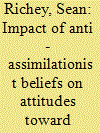| Srl | Item |
| 1 |
ID:
176213


|
|
|
|
|
| Summary/Abstract |
Much recent literature has examined the correlates of anti-vaccination beliefs, without specifying the mechanism that creates adherence to these debunked ideas. We posit that anti-vaccination beliefs are an outcome of a general psychological propensity to believe in conspiracies based on new research on the interconnectedness of conspiracy beliefs. These ideas are tested with a confirmatory factor analysis and a seemingly unrelated regression (SUR) model of a nationally representative U.S. sample from the 2016 American National Election Studies. The confirmatory factor analysis shows that anti-vaccination beliefs highly correlate with belief in the unrelated conspiracies that Obama is a Muslim and 9/11 trutherism. Our SUR models also show that all three of these very different beliefs have similar predictors. All three have a negative correlation with political trust, political knowledge, education, and a positive correlation with authoritarianism. Thus, anti-vaccination beliefs are shown to be part of a psychological propensity to believe in conspiracies
|
|
|
|
|
|
|
|
|
|
|
|
|
|
|
|
| 2 |
ID:
171281


|
|
|
|
|
| Summary/Abstract |
Google Books Ngrams data are freely available and contain billions of words used in tens of millions of digitized books, which begin in the 1500s for some languages. We explore the benefits and pitfalls of these data by showing examples from comparative and American politics. Specifically, we show how usage of the phrase “political corruption” in Italian, French, German, and Hebrew books strongly correlates with Transparency International’s well-cited Corruption Index for France, Italy, German, and Israel. We also use Ngrams to show that the explosive growth in usage of the phrases “Asian American,” “Latino,” and “Hispanic” correlates with real-world changes in these populations after the Immigration and Nationality Act of 1965. These applications show that Ngram data correlate strongly with similar data from well-respected sources. This suggests that Ngrams has content validity and can be used as a proxy measure for previously difficult-to-research phenomena and questions.
|
|
|
|
|
|
|
|
|
|
|
|
|
|
|
|
| 3 |
ID:
095381


|
|
|
|
|
| Publication |
2010.
|
| Summary/Abstract |
I outline different beliefs about assimilation, and show that these beliefs can influence attitudes toward immigration. Using data from a new national sample survey in Japan, I test whether and how beliefs about assimilation influence attitudes toward immigration. The results show two important conclusions. First, there is a large anti-immigrant sentiment in Japan. Second, after controlling for other known determinants of attitudes toward immigration, I find that those who are in favor of immigrant assimilation support higher levels of immigration, more immigrant equal rights, and have more accurate views about immigrant crime in Japan. This suggests that those favoring assimilation are not necessarily xenophobic in all cultures.
|
|
|
|
|
|
|
|
|
|
|
|
|
|
|
|